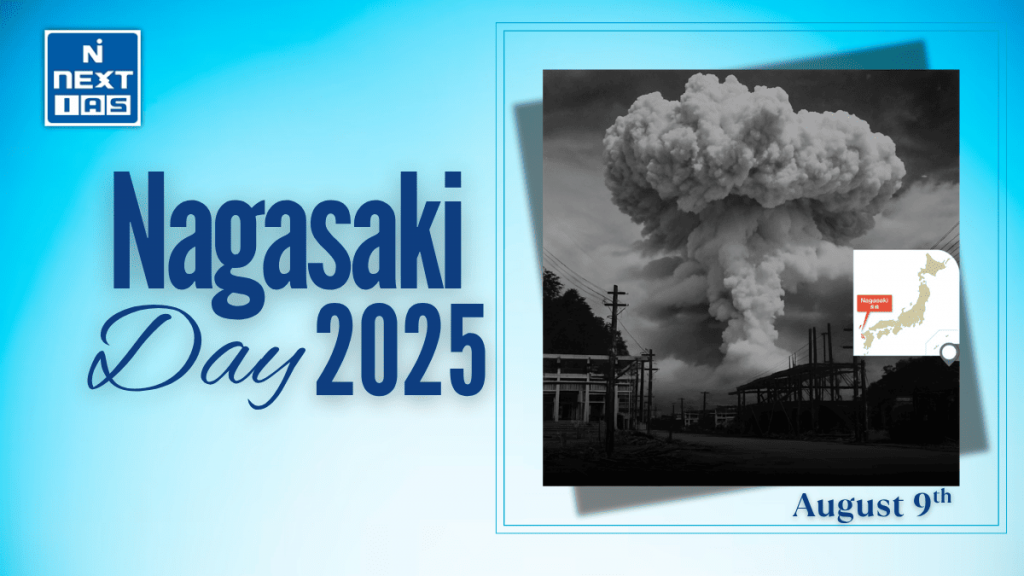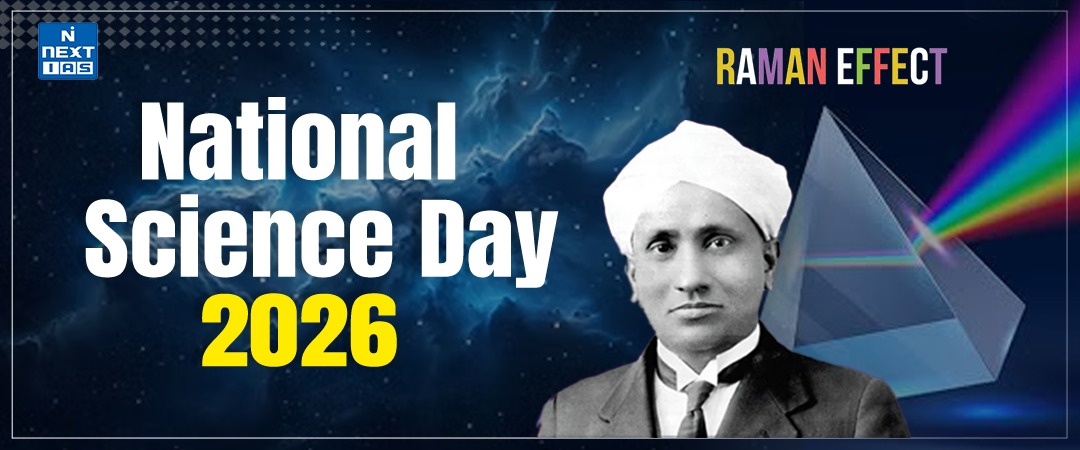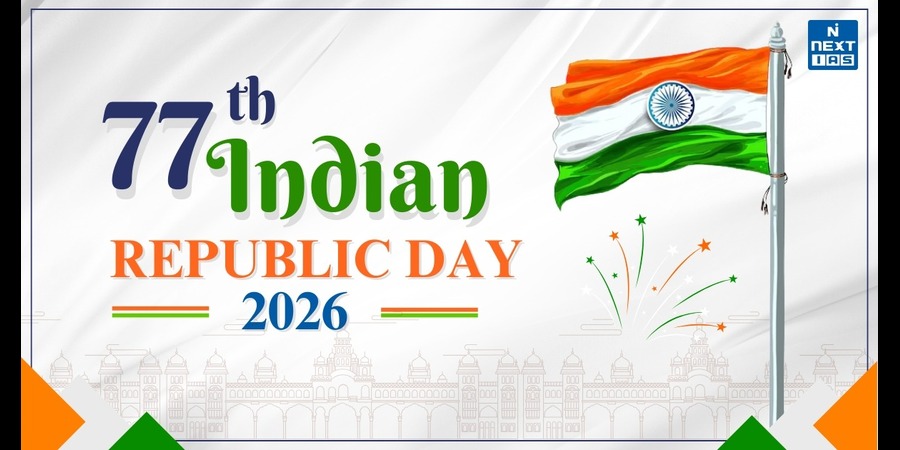
Nagasaki Day 2025 (9 August) remembers the atomic bombing of Nagasaki in 1945, to commemorate the victims and the survivors. It was a day for solemn remembrance of nuclear warfare and its awful effects, allowing the cause of world emergency, nuclear disarmament, and ensuring that such a tragedy never occurs again to take front stage.
Historical Background of Nagasaki Day
- Nagasaki Day basically commemorates another dark day in the book of history: August 9, Nagasaki Day, commemorating the tragic occurrence of the atom bombing on the Japanese city of Nagasaki during World War II in 1945.
- Three days after Hiroshima was bombed, on August 9, 1945, at 11:02 a.m., the United States dropped the atomic bomb codenamed “Fat Man” on Nagasaki.
- More than 74,000 people were killed instantly by the blast, and millions more suffered injuries and exposure to radiation, furthering their long-term pain.
- The urban landscape of Nagasaki was wiped out, and the survivors, known as hibakusha, were left with lifelong physical illness and psychological trauma.
- The bombing then decided the fate of Japan, bringing an end to the war and ushering in the nuclear age.
- Nagasaki Day is more than just an auspicious occasion to mourn the countless for whose lives were lost; it still remonstrates against the colossal human and moral costs of nuclear warfare while galvanizing global efforts for lasting peace and nuclear disarmament.
Impact and Aftermath of Nagasaki Day 2025
- One devastating way of describing actions and consequences of the atomic bombing that took place over Nagasaki on August 9, 1945, in this place are numerous.
- The bomb hit, instantly wrecking large parts of the city and killing more than 74,000 by the end of 1945.
- Many others suffered grave injuries and burns-from those who survived (hibakusha) onward with countless chisels of suffering: life-long trauma, radiation-related diseases, discrimination, and stigma.
- Following that, very high numbers of leukemia and other kinds of cancers started to occur among survivors.
- Further along came psychological effects of anxiety and post-traumatic stress that stretched through generations.
- The city’s infrastructure and economic life were crippled, with rebuilding a matter of many years.
- Being the last time nuclear explosive devices were used in war, the Nagasaki bombing cast towering shadows on the entire world consciousness, serving as a rallying point for disarmament and peace.
- Today, the legacy of Nagasaki stands as a somber warning against nuclear warfare and bears testimony to human spirit and the continued struggle for a world free of nuclear threats.
Legacy and Importance of Nagasaki Day 2025
- The legacy and importance of Nagasaki Day are deeply ingrained in generations and across borders.
- Nagasaki Day stands as a grim reminder of the nuclear destruction capability and the unfathomable human suffering in 1945.
- More than 74,000 were killed, and countless others have been medically affected and traumatized for life, turning survivors or hibakusha into global peace advocates.
- The Nagasaki tragedy reinforced the call for urgent action on nuclear disarmament, influencing treaties and peace movements everywhere.
- This day commemorates those who died and were affected and calls humankind to consider moral and ethical obligations in the atomic age.
- By commemorating Nagasaki Day, we rededicate ourselves to ensure that such suffering will never again be unleashed; to educate future generations in the virtues of peace and reconciliation; and to the realization of a nuclear-free world.
Commemorations and Observances of Nagasaki Day 2025
- The year 2025 will witness Nagasaki Day events and observances to commemorate the victims of the atomic blast and proclaim a peace-centered agenda.
- The main flowers ceremonies take place at the Nagasaki Peace Park, where survivors (hibakusha), families, government officials, and other visitors assemble.
- Memorial ceremonies retain moments of silence at 11:02 A.M. (time of bomb), peace declarations by the mayor of Nagasaki city, wreath-laying, and water pouring for those who perished in agony from burns and thirst.
- Schools and organizations across Japans sponsor educational programs, exhibitions, and survivor talks to give firsthand testimonies.
- The youngsters help run events, candlelight vigils, and bell-ringing ceremonies for the sake of spreading the call to future generations.
- Throughout the world, peace organizations organize webinars, art exhibitions, and discussion parties that focus on nuclear disarmament, reconciliation, and everyone’s urge for life free from nuclear weapons.
- Such ceremonies reinforce collective intent for peace and commemoration.
Global Relevance of Nagasaki Day
- Nagasaki Day, observed on August 9, has a worldwide significance for humanity in its powerful message: to avert the tragedy that nuclear warfare has already undergone.
- At this time, the world honors the victims of the atomic bomb in Nagasaki and reflects on the enormous consequences of nuclear weaponry.
- It stands as a stark reminder to the international community about the grave dangers that come with the spread of nuclear weapons and the continued agony that such weapons bring.
- Nagasaki Day observance goes beyond national borders to that underscore peace, reconciliation, and the compelling moral basis to pursue the disarmament of nuclear weapons.
- Educational activities, statements, and peaceful declarations in the various countries all enforce peaceful global solidarity, responsible leadership, and diplomatic engagement to resolve conflicts.
- This day commemorating reminds the world to remain committed to the cause of peace, the implementation of support to nuclear survivors as well as the sustenance of culture upon which lessons from Nagasaki can inspire future generations towards a safer and nuclear-free world.
Conclusion
The Day in Nagasaki stands as a dreadful memory of the consequences of nuclear warfare. Paying respects to the victims, it reinstates the common will towards permanent peace and nuclear disarmament. This day imparts renewed vigor in the will to avoid the repetition of such tragedies and to work towards a safer and more just world for generations to come.
Also Read: Hiroshima Day 2025





